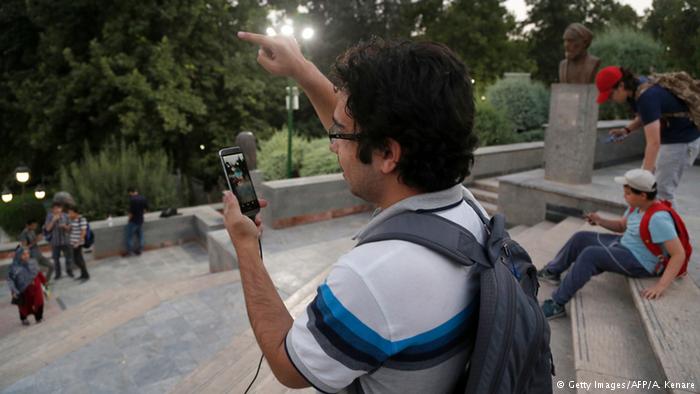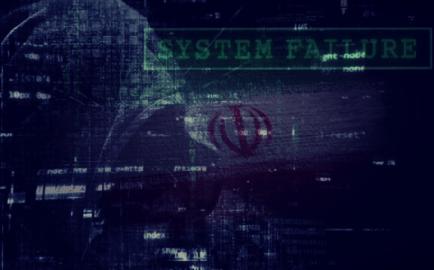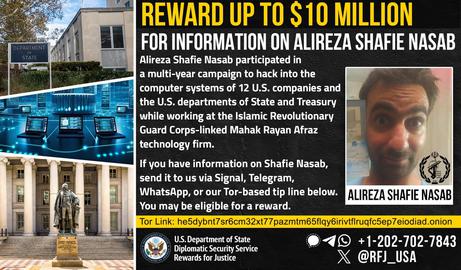From 8pm, they grabbed their mobiles and set out for Bam-e Tehran, or “Tehran’s Roof”, a cool area on the slopes of the Alborz mountains with a panoramic view of the city. The walk is a nice one — and they had the opportunity to catch Pokémons at the same time.
Authorities blocked Pokémon Go on August 5, making Iran the first country to ban the game, which has enjoyed enormous popularity around the world. Abdolsamad Khoramabadi, secretary of the Working Group to Identify Illegal Content, told Tasnim News Agency that the ban was directly related to security concerns and that the vote to ban it was unanimous among the committee. “This game is a combination of virtual and real worlds and, besides many other objections, it can create many security problems for the people and the country,” he said. He did not elaborate on the nature of the risks.
But most Iranians are somewhat relaxed about the ban, as with many bans in Iran. “It works if you have a filter breaker — and everybody now has filter breakers,” said a player called Zahra. “We used them for Facebook and Twitter. Now we use them for Pokémon, too.”

Even before the working group’s announcement, Iranians knew what was going on; many gaming hopefuls emailed Iran’s National Computer Games Foundation’s public relations team and demanded that the filter be removed. The foundation’s website published an interview with Javas Amiri, its vice president, who said that Pokémon Go was not offensive and did not cross any red lines, but because some of the game’s features went beyond the scope of mere entertainment, it was subject to scrutiny from a range of Iranian authorities, including the security agencies. Those agencies must give their consent before any final permit could be issued.
Hasan Karimi Ghoddousi, head of the foundation, also spoke to the public about Pokémon Go. “We had an email exchange with the makers of this game,” he told Mehr News Agency. “If they want to distribute this game in Iran, it must go through the filter of National Computer Games Foundation.” He said if the game’s creators refused, the foundation had no other option but to filter it and prevent its distribution. He added that the game could only be introduced in Iran on two conditions: “The main server for the game must be located in Iran, and the identification of locations for tagging must be coordinated with the National Computer Games Foundation.” He added that security and military locations must be excluded, because members of the public are not allowed in such places.
A No-Go for Security Agencies
Khoramabadi — who, in addition to heading up the committee charged with identifying illegal content, is also a judge — and Iran’s Deputy Prosecutor General both defended the Working Group to Identify Illegal Content's approach. Khoramabadi said the committee had looked at the decision to ban Pokémon Go from all angles, and emphasized that the group’s decision had been welcomed by many government agencies, including the security agencies. The group has 13 members comprised of top government officials or their representatives. It decides what Iranians can watch, read or listen to online. The following ministers and officials sit on the committee:
- Iran’s Prosecutor-General
- head of Islamic Republic of Iran Broadcasting (IRIB)
- Minister of Intelligence
- Minister of Culture and Islamic Guidance
- Minister of Justice
- Minister of Communications and Information Technology
- Minister of Science and Technology
- Minister of Education
- National Police Commander
- A communication and information technology expert selected by parliament’s Industries and Mines Committee
- A member of Parliament’s Judicial Committee
- Head of the Islamic Propaganda Organization
- A representative of the Supreme Council of Cultural Revolution
According to Khoramabadi, all agreed that Pokémon Go should be banned, without exception.
Enter the CIA and a World of Paranoia
Several days on from the Pokémon Go ban, Gerdab, the official website of the Revolutionary Guards’ own cybercrimes unit, published an article outlining why the game had to be filtered. Again, the primary reason was concerns for national security. The article goes so far to state that Pokémon Go has a link with the United States intelligence services. “Currently the US and its intelligence services receive geographic information about various places in the world through apps,” the article said, adding that this information was “hundreds and perhaps thousands of times more accurate that what you can find on Google Earth and Google Maps.”
The author of the article went on to say that these foreign secret agencies did not have access to technology or software that would allow them to view this type of detailed geographic data, so they came up with another idea: Pokémon Go. “The best way is to ask people to take 3D pictures and videos from important locations in their country and transmit it,” the article said. And how this is done? “It is simple enough: Put a Pokémon in the desired location. Then a large number of people unknowingly go to that location to hunt and send a good volume of pictures and videos to that spy agency.”
The Gerdab journalist also argued that “a senior KGB official” was aware that the CIA had designed Pokémon Go to gather 3D information about target countries and to use and analyze such information where necessary. The fact that the writer referred to the KGB — which no longer exists — calls into question the veracity of the article.

Further down, the article ventured into an even more exotic, unreal territory, claiming that a great number of Pokémons had been placed inside popular Shia religious shrines and pilgrimage sites in Qom and Mashhad. The author did not elaborate on what spy agencies’ interest in holy sites might be.
“It is interesting to note that the Pokémons like to hide around or even inside our military installations to encourage you to come, find and hunt them,” the writer said. “You might think that they are there just by accident — but in fact, they have been placed there on purpose.” To prove his point, he cited the example of Israeli military installations and the Western Wall. “This not a hallucination. When the Israelis declare Pokémon Go a ‘superspy’ game it is clear what is going on behind the scenes. When countries like Saudi Arabia and other countries that engage in espionage ban Pokémon Go then something must be going on.” It would seem that, as with the reference to the KGB, the author is unaware that the practice of restricting access to military sites for the purpose of photography has been employed by many countries around the world for quite some time. Restrictions on taking photographs of religious sites in Israel and Saudi Arabia started long before Pokémon Go was even a glimmer in its creators’ eyes.
In conclusion, the author wrote: “If Pokémon Go became popular in Iran, then the 3D maps of various locations in Iran could have been easily obtained by them. If one day you notice that Pokémons are interested in Iranian security and nuclear sites, do not be surprised. This game is very dangerous.”
As I was finishing this article, Pokémon Go enthusiast Zahra got in touch, and sent me a photograph of herself hunting Pokémons. “My room is full of Pokémons,” she said. And, with a laugh, I said to myself: I guess Zahra’s room is a nuclear site, and that foreign spy agencies will be taking note.
visit the accountability section
In this section of Iran Wire, you can contact the officials and launch your campaign for various problems






















comments